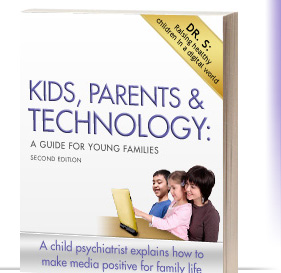Originally published by ThinkerMedia: BestThinking.com on December 25, 2012
Summary: Expert urges American Academy of Pediatrics to update screen time guidelines to include tablets and gives parents interim guidance for best use of new tablets for children.
Now that the holiday season is over, many children have in their hands new iPads and Minis and other tablets. As the use of tablets increases among children of all ages, questions and concerns are once again raised about the effects these devices have on children. But parents have had little guidance. The American Academy of Pediatrics (AAP) recently reaffirmed its stance that parents hold off on any form of screen time until children are two, and limit older preschoolers to less than two hours daily.
However, according to Eitan Schwarz, MD, faculty member at Northwestern University Medical School, expert child and adolescent psychiatrist, families, media and violence, “The AAP guidelines are simply out of date and wrong. While that may seem like a dramatic statement, it stems from the facts that not all screens are the same, nor that interactive experiences are necessarily equivalent to watching TV, nor that any studies have shown damage from early supervised exposure to interactive tablets. To the contrary, several studies and many enthusiastic anecdotal teacher reports show that children become better engaged and learn well via tablets.”
Dr. Schwarz adds, “Simply put: Parents may be doing more harm than good by removing or over-limiting tablets from the lives of their preschoolers. Moreover, the AAP’s two hour daily maximum for preschoolers passively watching TV (while often snacking and leading to obesity) is way too long.” In fact, Dr. S believes that much less TV and more tablet interactivity time of balanced developmental and educational challenges with parent involvement would be much healthier (and probably less likely to be accompanied with snacking.)
Why tablets are beneficial to children
According to Dr. Schwarz, “Unlike television, which can damage psychological development, touchscreen devices – like tablets – have been found to promote learning. Recent research has shown that touchscreens can enhance learning and that calm, creative activities on the touchscreen, such as painting, were similar to their “real world” counterparts in that they “do not seem to adversely affect children’s behavior or attention in the short term.””
Tablets are an essential part of preparing kids for a lifetime of responsible technology use. As tablets and touchscreen devices proliferate, ask this: Will my child be left behind if her grade school, high school or college integrates these popular technologies into the classroom? Being present with children as they learn about tablets helps them realize the benefits while minimizing the risks.
According to Dr. Schwarz, “Rich graphics and engaging gameplay are big motivators for young children. More and more, tablets and educational video games are being embraced by educators and have been shown to increase learning and engagement. There is actually powerful increasing evidence that interactive video games can actually promote healthy behaviors. Parents can bring to children the rich contents of the Internet and many educational and fun apps.”
What tablet activities are harmful to children?
In the past, aggressive games commonly included war games, fighting with toy swords or rifles, and waging war with G.I. Joes by (mostly boy) children. Such limited violence experiments served much the same way as in many mammalian species to practice survival and hunting skills. The vast majority of kids played to master and eventually transform childhood aggressive impulses into later sports competition, healthy ambition and assertion.
According to Dr. Schwarz, “Video games are supposed to serve our kids today in the same way. But something is now very wrong. Magical enchanting video games, with their brilliantly engaging action, graphics and audio, can too readily draw our (mostly boy) children over the top into too intense anti-social and too violent attitudes. The unlimited anti-social or sometimes addicting mayhem and utter pointless damage perpetrated by our youngsters themselves to animal- or human-like creatures in violent games tragically bring out the worst in kids.”
The role of parents in supervising and limiting video game use has again recently taken center stage. Parents worry correctly that tablets can be used anywhere and anytime and are more difficult to supervise. Yet actually, some tablets can be much easier to control than TV, for example with ZillyDilly for iPad and Mini, a new browser management system, so that the best content can be preselected and time spent limited.
The bottom line
Dr. S states, “The time has come for the AAP to revise its screen time guidelines for preschoolers to include less TV and more supervised and controlled interactive media time.”
In the meantime, the benefits of tablet use amongst children are being researched and discovered every day, so parents should make informed, responsible decisions about their children’s tablet use to ensure that they get all the benefits they have to offer. How can you start incorporating positive, fun, educational tablet activities into your family’s life? It’s easier than you think. Dr. Schwarz compiled a list of ten easy ways for parents to ensure safe tablet time for their families.
The Doctor’s Checklist: 10 Ways Parents Can Encourage Safe, Fun Tablet Use
- Ensure that your child’s games have an agerating that is appropriate for their age. 90% of teenagers say their parents never check game ratings before allowing them to buy them. Always refer to App Store ratings to ensure the games your child wants are rated for his/her age group.
- Ensure that any tablet or game use is done in a family setting.Allowing children to use tablets or other smart devices in private can encourage unhealthy and antisocial behaviors. Instead, limit use to family settings and snacking and accompany your young players in their adventures.
- Consult fellow parents and trustworthy resourcesfor an accurate, in-depth review of a game/app before purchasing it. If you’re unsure of a game’s rating or content, check with the child’s teacher or use online resources like Common Sense Media to help inform your decision. You can also visit MyDigitalFamily.org or refer to Kids, Parents & Technology: A Guide for Young Families .
- Limit time spent with tablets/media. Games are good for eye-hand coordination, but they can easily occupy inordinate amounts of time. Be sure that tablet time is balanced with quality family time and activities. A browser like ZillyDilly for iPad or Mini provides age-appropriate time limits and content.
- Keep tablets and smart devices in a common area.Tablets should be treated like appliances, so create a common area where they can be charged and parked to help create media free zones.
- Balance contentbetween healthy growth and mere entertainment, imaginative creativity and empty-headed reactivity to screen content, reflective and busywork, handling three-dimensional and other materials like clay and painting and manipulating images on two dimensional screens, and between active play and lazy sitting and snacking. Be aware of signs that your child is over-engaged or addicted to games or a device, and put proper use restrictions in place to counteract this behavior, and don’t hesitate to consult a credentialed specialist. The younger your child, the more permanent is the brain he is forming.
- Limit web use to age-appropriate sites. It’s too easy to stumble upon unsafe or inappropriate online content. Keep online activity restricted to age-appropriate sites and monitor online activity closely. Not all “educational” apps are actually educational.
- Get involved with your child’s teachers to ensure that school work isn’t suffering. To make sure that you’ve struck the right balance of tablet use in your home, keep a close eye on your child’s performance. If grades begin to slip, it might be time to revisit his/her media plan and adjust it.
- Talk to the parents of your child’s friends to learn what media they allow in their homesso when your child begins to have sleepovers and play dates, they aren’t playing any violent games or spending too much time online or snacking.
- Require your approval for all game/app purchases.Establish the rule early on that your approval is required for all game purchases. If tablet purchases are made using your personal information, be sure to keep your username, payment information, and password private. This will ensure that no unapproved apps will show up on your device.
Eitan Schwarz, MD, FAACAP, DLFAPA, is a double board-certified child and adolescent psychiatrist with 42+ years of continuing office practice and service to kids and families in Chicago area schools and agencies. Dr. Schwarz, also known as Dr. S, was also a play therapy tech media researcher, has done extensive writings on the effects of violence, technology and screen time on children. He is the inventor of ZillyDilly.
(c) Copyright 2012 Eitan Schwarz MD
Keywords: iPad, tablets, screentime, screen time, american academy of pediatrics, kids, TV, Mini, Apple, video game, violence, parent control, zillydilly, browser, education, safety, video game violence, video game healthy, interactive, media, guidelines, manage
Article by Eitan ‘Dr. S®’ Schwarz, MD
©All rights reserved



Dr. S to Pediatricians: Please Update Your Screen Time Guidelines ASAP to Include Tablets
Originally published by ThinkerMedia: BestThinking.com on December 25, 2012
Summary: Expert urges American Academy of Pediatrics to update screen time guidelines to include tablets and gives parents interim guidance for best use of new tablets for children.
Now that the holiday season is over, many children have in their hands new iPads and Minis and other tablets. As the use of tablets increases among children of all ages, questions and concerns are once again raised about the effects these devices have on children. But parents have had little guidance. The American Academy of Pediatrics (AAP) recently reaffirmed its stance that parents hold off on any form of screen time until children are two, and limit older preschoolers to less than two hours daily.
However, according to Eitan Schwarz, MD, faculty member at Northwestern University Medical School, expert child and adolescent psychiatrist, families, media and violence, “The AAP guidelines are simply out of date and wrong. While that may seem like a dramatic statement, it stems from the facts that not all screens are the same, nor that interactive experiences are necessarily equivalent to watching TV, nor that any studies have shown damage from early supervised exposure to interactive tablets. To the contrary, several studies and many enthusiastic anecdotal teacher reports show that children become better engaged and learn well via tablets.”
Dr. Schwarz adds, “Simply put: Parents may be doing more harm than good by removing or over-limiting tablets from the lives of their preschoolers. Moreover, the AAP’s two hour daily maximum for preschoolers passively watching TV (while often snacking and leading to obesity) is way too long.” In fact, Dr. S believes that much less TV and more tablet interactivity time of balanced developmental and educational challenges with parent involvement would be much healthier (and probably less likely to be accompanied with snacking.)
Why tablets are beneficial to children
According to Dr. Schwarz, “Unlike television, which can damage psychological development, touchscreen devices – like tablets – have been found to promote learning. Recent research has shown that touchscreens can enhance learning and that calm, creative activities on the touchscreen, such as painting, were similar to their “real world” counterparts in that they “do not seem to adversely affect children’s behavior or attention in the short term.””
Tablets are an essential part of preparing kids for a lifetime of responsible technology use. As tablets and touchscreen devices proliferate, ask this: Will my child be left behind if her grade school, high school or college integrates these popular technologies into the classroom? Being present with children as they learn about tablets helps them realize the benefits while minimizing the risks.
According to Dr. Schwarz, “Rich graphics and engaging gameplay are big motivators for young children. More and more, tablets and educational video games are being embraced by educators and have been shown to increase learning and engagement. There is actually powerful increasing evidence that interactive video games can actually promote healthy behaviors. Parents can bring to children the rich contents of the Internet and many educational and fun apps.”
What tablet activities are harmful to children?
In the past, aggressive games commonly included war games, fighting with toy swords or rifles, and waging war with G.I. Joes by (mostly boy) children. Such limited violence experiments served much the same way as in many mammalian species to practice survival and hunting skills. The vast majority of kids played to master and eventually transform childhood aggressive impulses into later sports competition, healthy ambition and assertion.
According to Dr. Schwarz, “Video games are supposed to serve our kids today in the same way. But something is now very wrong. Magical enchanting video games, with their brilliantly engaging action, graphics and audio, can too readily draw our (mostly boy) children over the top into too intense anti-social and too violent attitudes. The unlimited anti-social or sometimes addicting mayhem and utter pointless damage perpetrated by our youngsters themselves to animal- or human-like creatures in violent games tragically bring out the worst in kids.”
The role of parents in supervising and limiting video game use has again recently taken center stage. Parents worry correctly that tablets can be used anywhere and anytime and are more difficult to supervise. Yet actually, some tablets can be much easier to control than TV, for example with ZillyDilly for iPad and Mini, a new browser management system, so that the best content can be preselected and time spent limited.
The bottom line
Dr. S states, “The time has come for the AAP to revise its screen time guidelines for preschoolers to include less TV and more supervised and controlled interactive media time.”
In the meantime, the benefits of tablet use amongst children are being researched and discovered every day, so parents should make informed, responsible decisions about their children’s tablet use to ensure that they get all the benefits they have to offer. How can you start incorporating positive, fun, educational tablet activities into your family’s life? It’s easier than you think. Dr. Schwarz compiled a list of ten easy ways for parents to ensure safe tablet time for their families.
The Doctor’s Checklist: 10 Ways Parents Can Encourage Safe, Fun Tablet Use
Eitan Schwarz, MD, FAACAP, DLFAPA, is a double board-certified child and adolescent psychiatrist with 42+ years of continuing office practice and service to kids and families in Chicago area schools and agencies. Dr. Schwarz, also known as Dr. S, was also a play therapy tech media researcher, has done extensive writings on the effects of violence, technology and screen time on children. He is the inventor of ZillyDilly.
(c) Copyright 2012 Eitan Schwarz MD
Keywords: iPad, tablets, screentime, screen time, american academy of pediatrics, kids, TV, Mini, Apple, video game, violence, parent control, zillydilly, browser, education, safety, video game violence, video game healthy, interactive, media, guidelines, manage
Article by Eitan ‘Dr. S®’ Schwarz, MD
©All rights reserved